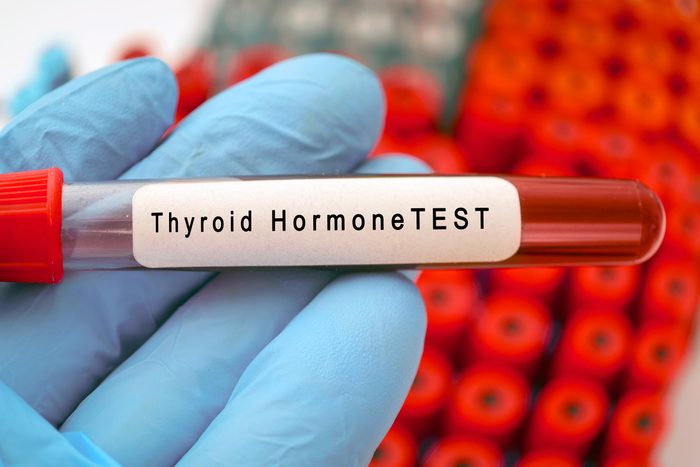Do You Have an Under-active Thyroid? This 90-Second Quiz Helps You Find Out
Updated: Apr. 17, 2023

Around 10% of American adults have hypothyroidism. Medical doctors helped us develop this quiz to help you determine whether your thyroid hormone levels need to be checked out.
If you’ve ever suspected that your metabolism is a little sluggish, you might also wonder whether you have an under-active thyroid. According to the National Institute of Diabetes and Digestive and Kidney Diseases (NIDDK), around 5% of Americans aged 12 years or older have an underactive thyroid, or hypothyroidism. Thyroid experts like Dr. David S. Cooper, MD, MACP, with the division of endocrinology, diabetes, and metabolism at the Johns Hopkins University School of Medicine, suggest that the number of American adults experiencing mild hypothyroidism may be even higher—possibly closer to 10%.
Symptoms of an underactive thyroid can be vague, and many hypothyroid symptoms can be confused with other medical conditions. So while the most reliable method of diagnosing an under-active thyroid is to see a licensed healthcare provider who runs lab work—maybe repeatedly—signs of hypothyroidism can start with a few main clues.
And note how important this can be. An under-active thyroid doesn’t just cause frustrating questions about whether your body is utilizing calories as efficiently as it could. More severe cases of hypothyroidism can cause frustrating symptoms and pose health risks, in particular for cardiovascular health. Depending on how low your thyroid hormone levels are, medical treatment might be called for.
The Healthy @Reader’s Digest partnered with endocrinologists to develop a quiz that will help you determine whether it’s time to talk to your doctor about getting tested for hypothyroidism.
Get The Healthy @Reader’s Digest newsletter for wellness insights delivered to you daily
QUIZ: Do you have an underactive thyroid?
Do you have an under-active thyroid? Here’s what your results may mean
Dr. Cooper says that in general, if you experience several of the symptoms we asked about that can be linked with hypothyroidism, speak with your licensed doctor. In most cases, your doctor can determine whether you have hypothyroidism using a routine blood test that measures levels of thyroid stimulating hormone (TSH).
That said, Dr. Cooper says it’s important to remember that many of the symptoms that can be associated with hypothyroidism can be caused by other conditions. “Many of these symptoms are also experienced by people who are perfectly healthy,” he adds. Dry skin is one example. Also according to Dr. Cooper, severe hypothyroidism tends to be fairly rare in the United States.
When should I start taking medication to manage hypothyroidism?
Dr. Cooper says that if your TSH levels are only a little higher than normal, and you’re not experiencing any troublesome or severe symptoms, you may not need to start taking thyroid hormone replacement medications. But medically speaking, he says healthy levels of TSH tend to sit between 0.5 and 4, and people that have TSH levels of 10 or higher typically require treatment.
What are the health risks associated with hypothyroidism?
According to the experts, most health risks associated with hypothyroidism are related to severe or prolonged hypothyroidism, not mild cases. But Dr. Desai explains, untreated hypothyroidism can have long-term effects, ranging from mild conditions to life-threatening conditions. “Hypothyroidism has been linked to infertility [and an] increased risk of miscarriages,” she says. “It has been associated with birth defects, including impaired mental development.”
Dr. Desai adds that hypothyroidism can also cause elevated cholesterol levels, which can increase your risk of heart disease. She further explains that hypothyroidism can impact mental health, as it can lead to depression and can cause cognitive slowing. Hypothyroidism can also cause your thyroid gland to grow in size, which leads to the formation of a goiter, or enlarged thyroid gland.
Dr. Desai concludes by saying that in very severe cases of long untreated hypothyroidism, you can experience myxedema coma, which is a life-threatening condition that requires hospitalization.

















